Joaquín Panichelli puts unlikely Mirandés on his back
The 22-year-old already holds the Mirandés scoring record in a second tier campaign, and could yet propel an historic promotion for los Rojillos.
One of the best character references we have for Joaquín Panichelli, who swapped River Plate for Alavés in 2023, came before he’d even played a half’s worth of league football in Europe.
After coming on as a late substitute in the 2023 Segunda play-off final, the Argentinean would soon find himself face down on the turf. Unbeknownst to anyone at the time – including the disgruntled Levante supporters who could be forgiven for assuming he was time-wasting – the Alavés striker had just torn his cruciate ligament, and it would be seven-and-a-half months before he’d appear in his next game.
Except, Panichelli wasn’t done. A few minutes after the incident initially occurred, having carried on, his leg would give way completely upon his landing from a header, with pitch side microphones audibly capturing his agony. Then, after a short period of treatment on the sideline, Panichelli insisted on another return, waving in the direction of the bench that he was good to continue. And it would be the best part of another 10 minutes – where he continued to harass defenders and compete for every ball with whatever mobility he had left – before he’d finally be dragged off the pitch.
As woefully basic as it sounds, the starting point when analysing Joaquín Panichelli is rooted in that hunger; the type that compelled him to keep playing with a torn cruciate ligament as if it were a case of mind over matter and secondary to competition. Nothing that comes after that, be it technical ability or athleticism, can be separated from his unusually extreme implication. Even by Argentinean standards.
Despite scoring 20 goals in LaLiga Smartbank this season, Panichelli is one of those players you’d genuinely believe when he says the result is more important than him scoring (but without a single shred of a doubt). The former River Plate man seems truly unbothered by whether he’s the one scoring or not, and regardless of how much dirty work goes into the process that either will or won’t yield him a goal on any given day. Despite a prolific season, his application is not tied to whether it’s his day or how fruitful his service has been.
“Football is my source of work and could continue being in the future, but beyond that, I love this sport. I always played for the passion… the economic [side] is out of my control. I always prioritised playing; the recognition is secondary. It’s why, when there’s a goal from me or a teammate, I’m so happy. It’s how I live it. The people notice… '[laughs]”
Joaquín Panichelli — Diario De Burgos, November 2024
From the moment the referee blows his whistle, the 22-year-old demonstrably does everything in his power to affect winning. Haring after passes back to the goalkeeper, contesting every aerial duel in his radius, chasing every channel ball as if it’s the last one he’ll ever chase, fighting defenders on his back even for the smallest of victories… Panichelli just has the competitive gene that denies him behaving in any other way, and he channels it through all the requisite parts of being a no. 9 that don’t involve putting the ball in the back of the net.
In a similar way to how Ousmane Dembélé become the de facto ‘lead by example’ player by the end of PSG’s dominant campaign, in one of the most visible storylines of 2024-25, the Mirandés forward shares some of that contagiability. Not necessarily in the all-out pressing efforts, but by doing all the intangible bits with and without the ball at the head of the team, regardless of being a star player.
Thankfully for Alessio Lisci, the mantra of lead and others will follow already came in-built with Panichelli.
Extending the Mirandés goal glut
At the risk of having overdone the passion assessment, we’ll turn swiftly to the goals (and return a bit later).
As admittedly arbitrary a number as it is, we can all appreciate and recognise the merits of a 20-goal season. In Panichelli’s case, doing so earned him the best ever scoring season for a Mirandés player at second tier level — a pretty neat record even considering their relative inexperience at these heights.
In each Segunda season since 2021-22, Mirandés have managed to source a loanee forward who’s landed between 15 and 20 goals. Regardless of the manager, the style of play, or whether they’re a promotion contender or a relegation scrapper, the club have managed to repeat the feat for four years in a row — even when much wealthier organisations around them strain for their own no. 9 solutions. First there was Sergio Camello, then Raúl García, then Carlos Martín, and now Panichelli, who has pushed the bar a little higher in becoming the first to officially hit the 20 mark.
The next step for those Mirandés strikers who’ve gone before has always been upwards. Camello landed at Rayo Vallecano, Carlos Martín with Alavés, and Raúl García was bought for €8 million by Osasuna. That context alone suggests there’s a pretty good chance that Panichelli will soon be on a similar trajectory.
As well as that recent trend for Mirandés forwards, however, the Argentinean’s season holds some extra historical precedent for another reason: his age.
Plenty have had 20-goal campaigns at Segunda level, but not many have while aged under-23. That’s an exclusive club, comprised of only four footballers going as far back as 2008-09. And a look through the names on the list – even those who fell short of the 20 mark – paints a pretty solid picture as far as career advancement goes. Every player on the list (bar Panichelli) would go on to either be bought by a top-flight club or appear for one.
Fuelling a goal every other game
If we exclude the three penalties from Panichelli’s regular season haul, his 17 strikes were made up of seven goals with his stronger right foot, six headers, and four with his left foot (and all finished from inside the box).
His non-headed goals are pretty ordinary for a centre forward, but of course no less valuable or important for the lack of style points. Those goals look, well, exactly like what you’d expect from a no. 9 occupying the box and looking to position himself as the final stop in a team attack.
There’s a lot to like about how Panichelli does that. The consistency of the work that goes into arriving, being on time, and then competing for every bit of service that may or may not come his way rarely falters. Go back and watch practically any Mirandés game and you’ll be struck by the urgency with which he carries out that process, independent of whether his teammates have looked off the last 20 movements he’s made.
In the same way Carlo Ancelotti likes the term ‘pessimistic defenders’, the Mirandés forward is an ‘optimistic forward’. His motor keeps chugging and isn’t hampered by a lack of results or shortage of supply.
Panichelli’s headers represent perhaps the most striking part of his goal catalogue. Along with being a high-end tally in a Segunda season – only the fifth time in the last 10 campaigns a player has scored both 20+ goals and 5+ headers – the craft and execution behind his finishes really separate him from his peers.
We’re not talking about glancing finishes having gotten a run on his marker, or can’t-miss finishes with nobody near him. We’re talking about the emphatic stuff; the type of crashing headers that feel like the football equivalent of a dunk that takes the roof off the arena in basketball. Hang a cross up there and Panichelli will attack even the lowest quality of delivery without complaint.
The video below features all six of those finishes this season, along with a few other nice takes on the ground and some nice all-round support play (which we’ll get into soon).
That aerial force isn’t only a matter of height. Listed at roughly 6’2, Panichelli’s success revolves around a trifecta of decent height, hyperactive leaping, and a serious appetite for attacking deliveries. Indeed, the second of those is perhaps the most promising one with a view to the future. Panichelli’s stature and hunger aren’t going anywhere, but with this being his first full season as a player after suffering a torn ACL, he’s coped remarkably well on the physical side — both in terms of resistance to a punishing style of play and the condition of his athleticism.
Of the many examples on that front, his winning goal against Eibar in May wasn’t precisely a header, but did show off a Zlatan-esque flight. Scored in the 90th minute of a gruelling late-season match, Panichelli’s freakish bounce allowed his right foot to go where his head couldn’t reach, tucking home with his final contact not far off the height of the crossbar.
Meeting the moment of centre forwards
Everybody wants a no. 9 who’s big and athletic – even the teams who make 600 passes a game and have to stare down defensive blocks more often than not. With more teams pressing in high-energy spurts, and restarts turning into opportunities for even sizable underdogs to apply the squeeze, the current value of having a centre forward you can hit with a longer pass or begin to escape through feels pretty high.
All season long, Panichelli has shown off his developed game when playing as the reference up top, combining brute aggression with co-ordinated play when he’s battling against defenders. Opta don’t have a metric for ‘giving continuity to attacks by all means of contorted flicks and touch-pass spins round the corner with a defender draped all over you’, but if they did, Panichelli would surely be top of it. During the regular season, the 22-year-old ranked first (or joint-first) for headed goals, aerial duels won, total duels won, flick-ons and lay-offs. Meanwhile, no player in the top two tiers of Spanish football across the last 10 years has had a season with as many headed goals and aerial duels won as Panichelli this term.
Granted, Mirandés are a pretty direct team which affords him opportunities that other centre forwards might not have, but it’s also a case of the side playing to Panichelli’s strengths and even shaping their identity through him. They wouldn’t look for their no. 9 as often as they do if they weren’t confident he could extend their play – or at least give defenders hell in the process.
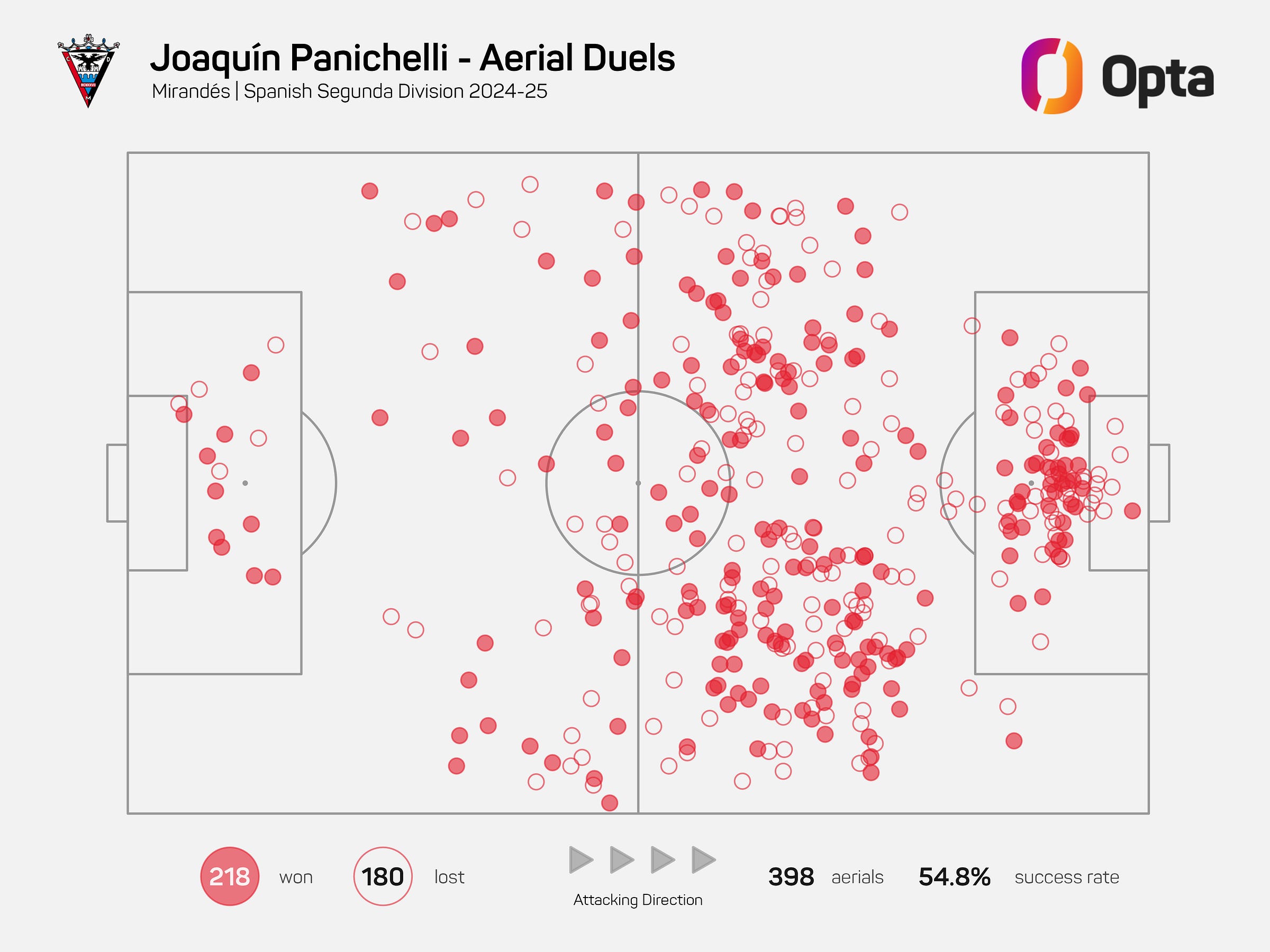
There are plenty of big-bodied strikers who can give you some of – if not a lot – of that, but the real value is found in what else comes with it. The no. 9s who can truly seize the moment are those who can play as the reference and prop up direct play, while also possessing the dynamism to run defenders the other way — even if it’s just enough of one supplementing the other.
On the scale of ‘target man to offside game-breaker’, Panichelli undoubtedly sits further to the left; a ways away from 2019-20 Darwin Núñez. He’s more likely to body a defender up than leave him in his trail. With that siad, his turn of speed and ability to repeat long, high-intensity runs still makes him a handful on the ground. It’s a pretty regular occurence to see Panichelli collapsed on the turf, his mouth agape, and socks rolled down after the final whistle. There’s a ranginess to his play — lots of repetitive lengthy runs — that wear on opposition defenders (not just himself).
If we’re to compare Panichelli’s coverage of the pitch with the other top-scoring centre forwards from the Segunda campaign (all of which are involved in this year’s play-offs), we can see his area of influence extends quite a ways beyond just the primary scoring zones. The 22-year-old is plenty active in the channels when it comes to contesting duels out wide and serving as a platform for Mirandés to secure and build attacks. Certainly compared with a more classic poacher style in Juan Carlos Arana of Racing, Panichelli gets through a mountain of work away from the box, often before spinning and making those hard efforts to arrive there.
That cycle of reference play has been a hallmark of Panichelli’s season. Direct ball played forward in his direction > tussle and scrap with marker to establish leverage > secure the ball and find the connecting pass > sprint to final third to either support the move or attack the box.
There’s a touch of the old school to the 22-year-old’s game in that respect. The way he carries out his back-to-goal game looks like something you’d see from a veteran forward, perhaps in a previous cycle of football where direct play was more pre-dominant as a first option. It’s not just that he’s excellent at holding the ball up, but that there’s plenty of nuance in doing so, as if wise to the tricks of leverage and how to manipulate the defender on his back.
Flowing out of hold-up play and into general play, as if they’re one action, is another hallmark of Panichelli’s game at the head of the team. The clips below from a win at Castellón are short on examples of the defender tussles previously mentioned, but do highlight some nice displays of securing forward balls and progressing into advantageous areas on the move.
The next steps
Next up for Panichelli is a play-off campaign that could result in one of the unlikeliest LaLiga promotions we’ve ever seen. Though he’ll be thinking in what he can do for the team more than what it can do for him, that serves as one of his routes to top-flight football.
Regardless of Mirandés’ play-off fate, however, his confirmation at the top level looks pretty well assured. His parent club Alavés have him tied down on a contract until 2029 and he’s made no secret of his ambition to succeed there in the long-term. Throw in the fact that Kike García — the veteran who so impressively led the line for the Vitoria club last term — is on his way out to join Espanyol, and all of a sudden, Panichelli now has the vacancy to go with the overwhelming case he’s made out on loan.
The danger now — or opportunity, depending on how they see it — is that other clubs with bugger budgets than Alavés are now circling an asset that had been dormant 12 months ago. According to reports, Strasbourg are willing to flex their BlueCo-inflated muscles and have offered 15 million euros for his signature, while other top-flight clubs from around Europe are also monitoring the situation. Whoever it may be, any number in that region would make a player Alavés picked up on a free one of the biggest sales in club history.
Though Panichelli’s upward trajectory already looks locked in, between his performance levels and historical context of what others have gone on to do after succeeding at this level, we can be equally sure in assuming he’s not thinking about anything other than 6:30pm on Sunday night at present. If he can drag this Mirandés side through the play-offs, a club that have turned water into wine by relying on an extreme strategy of young loanees might well just have a unanimous number one at the top of an already-extensive list.
What for many will represent the moment to take the intensity level up to 10 and leave everything out there in pursuit of an unlikely dream will, very likely, just be another day at the office for Joaquín Panichelli.




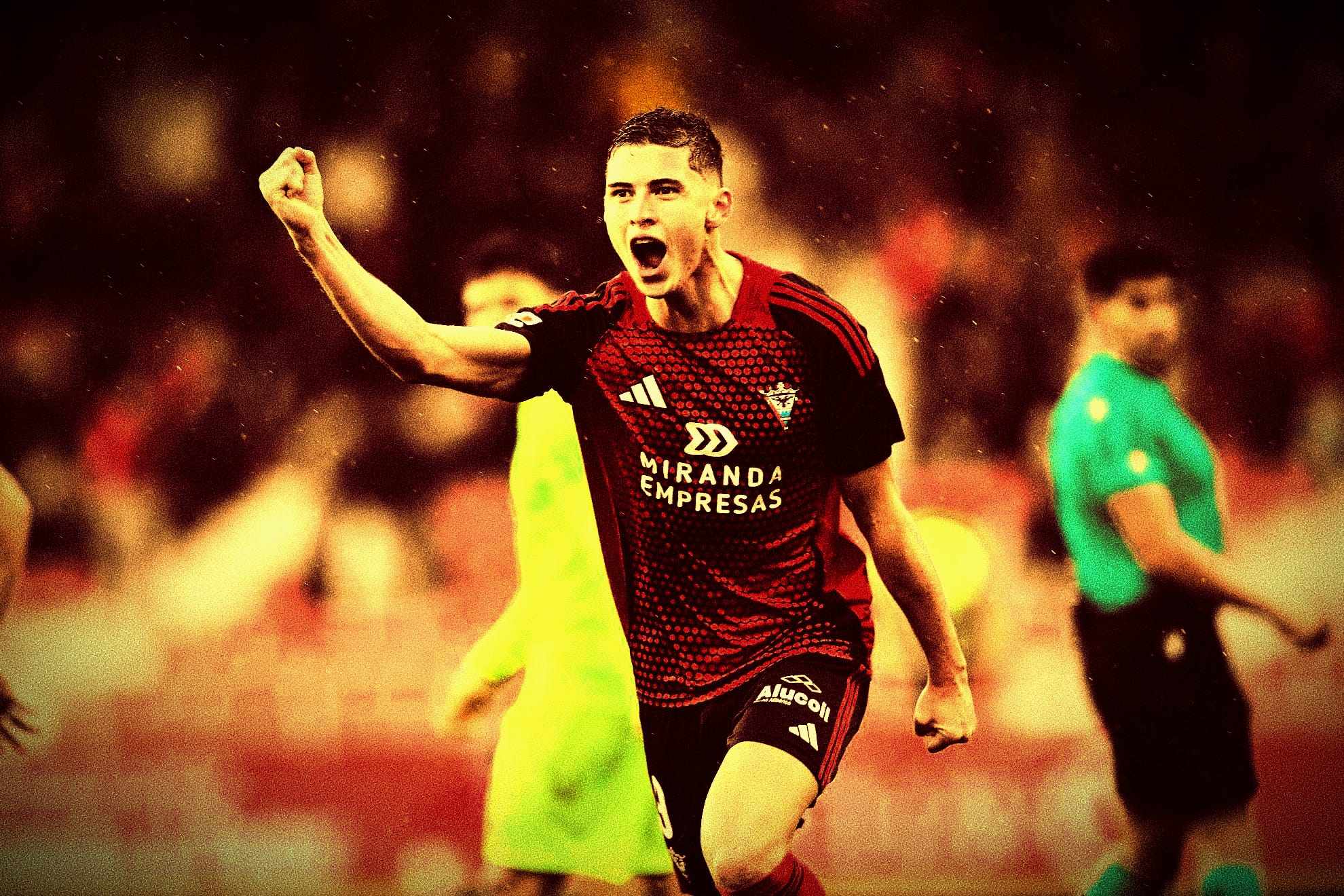
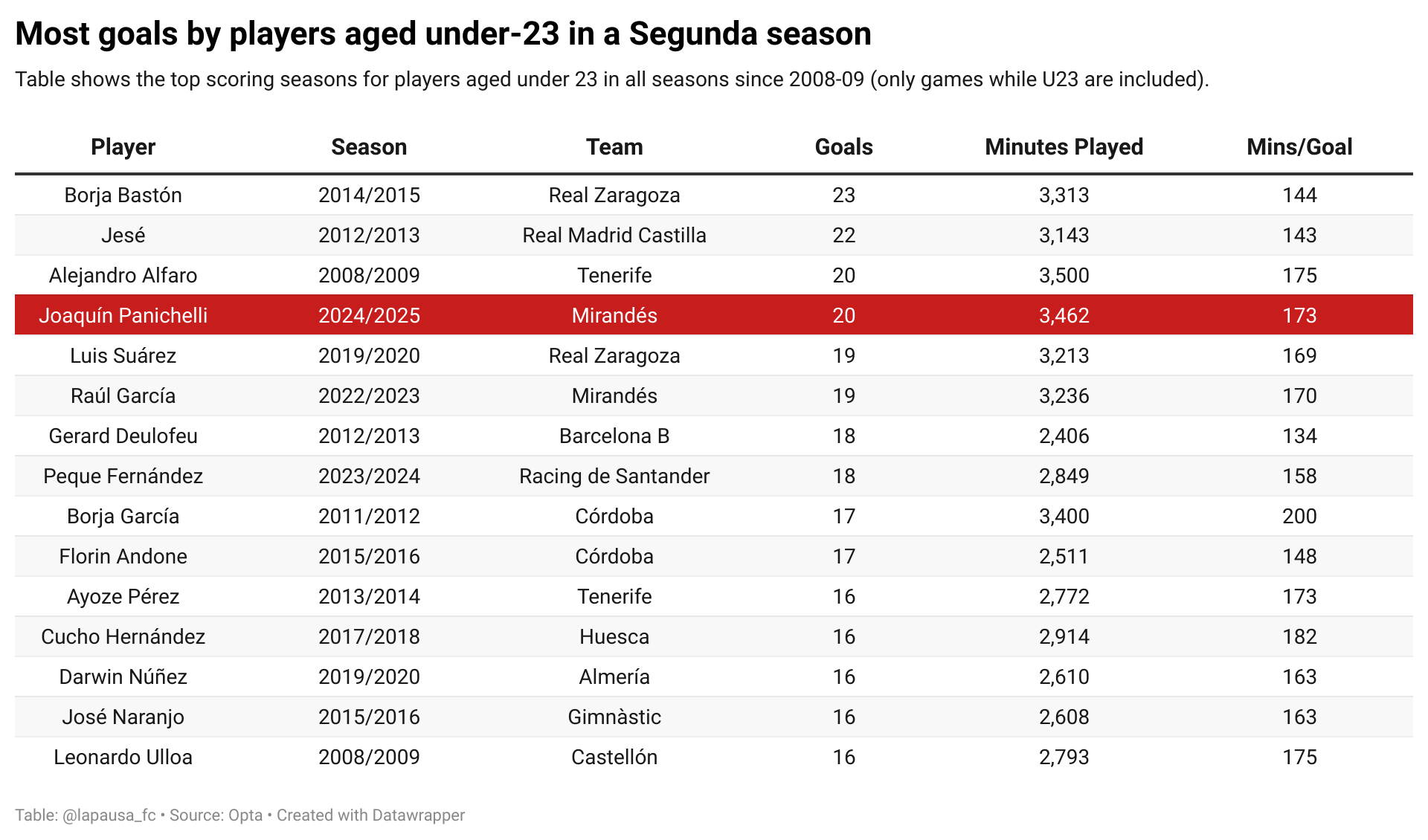
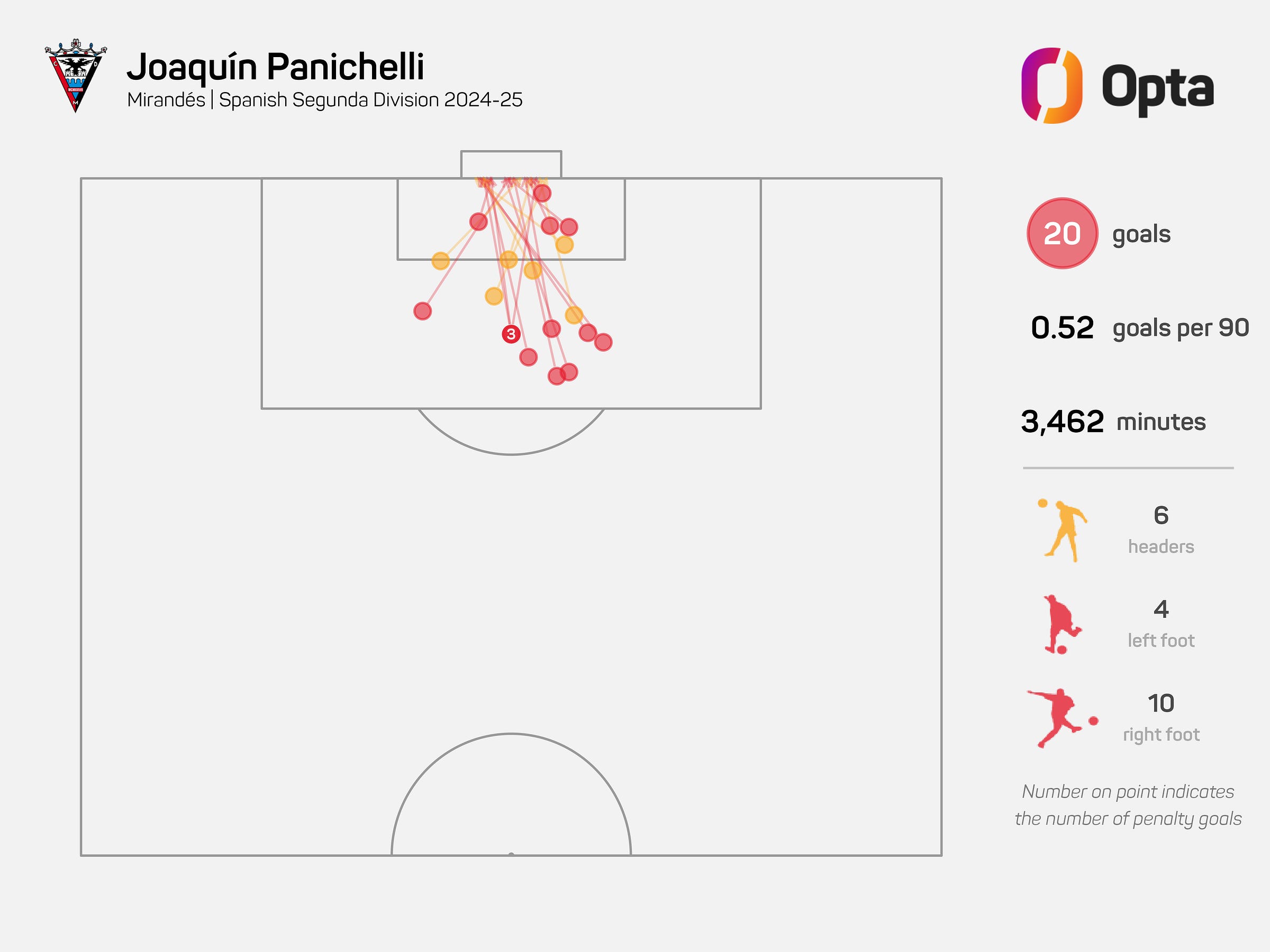
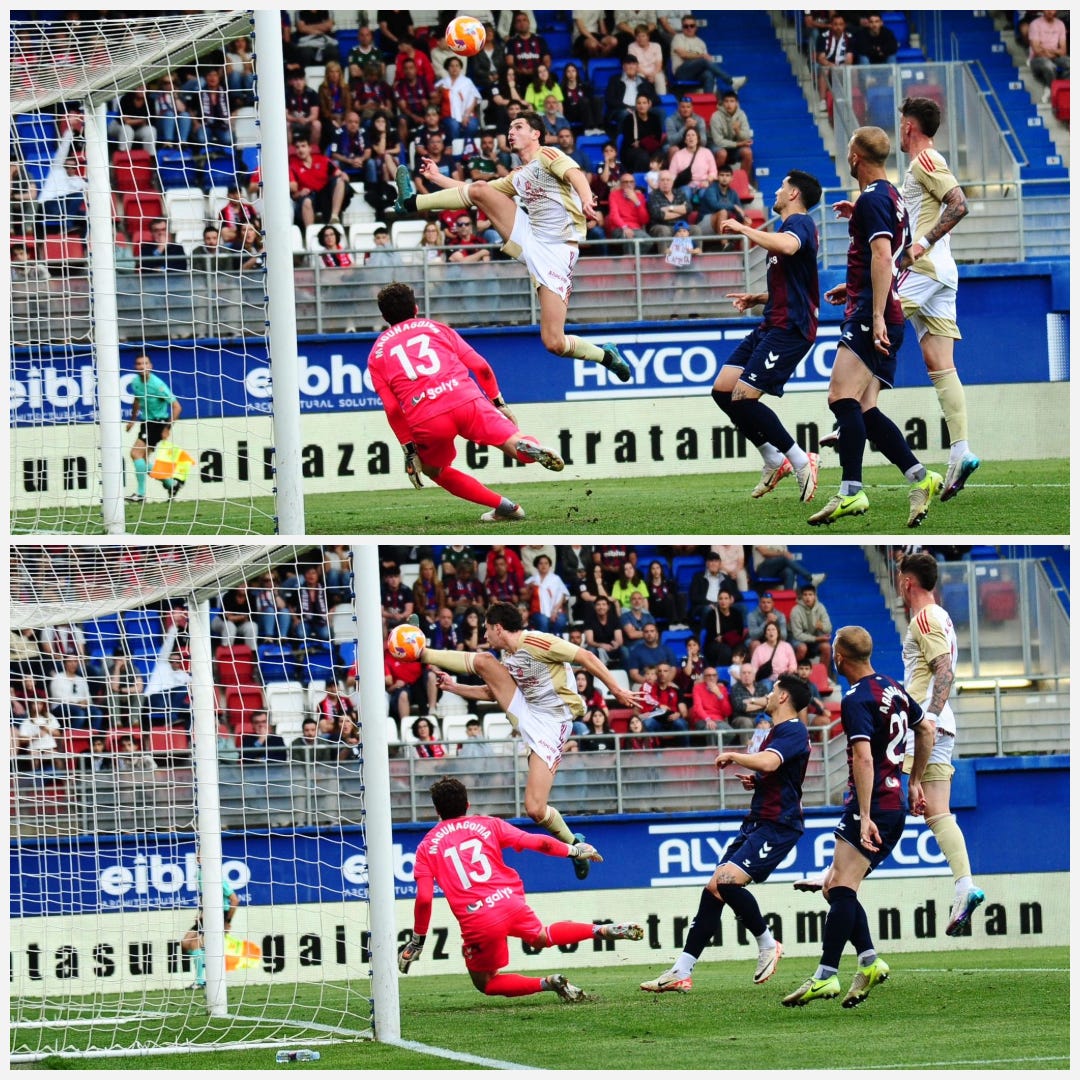
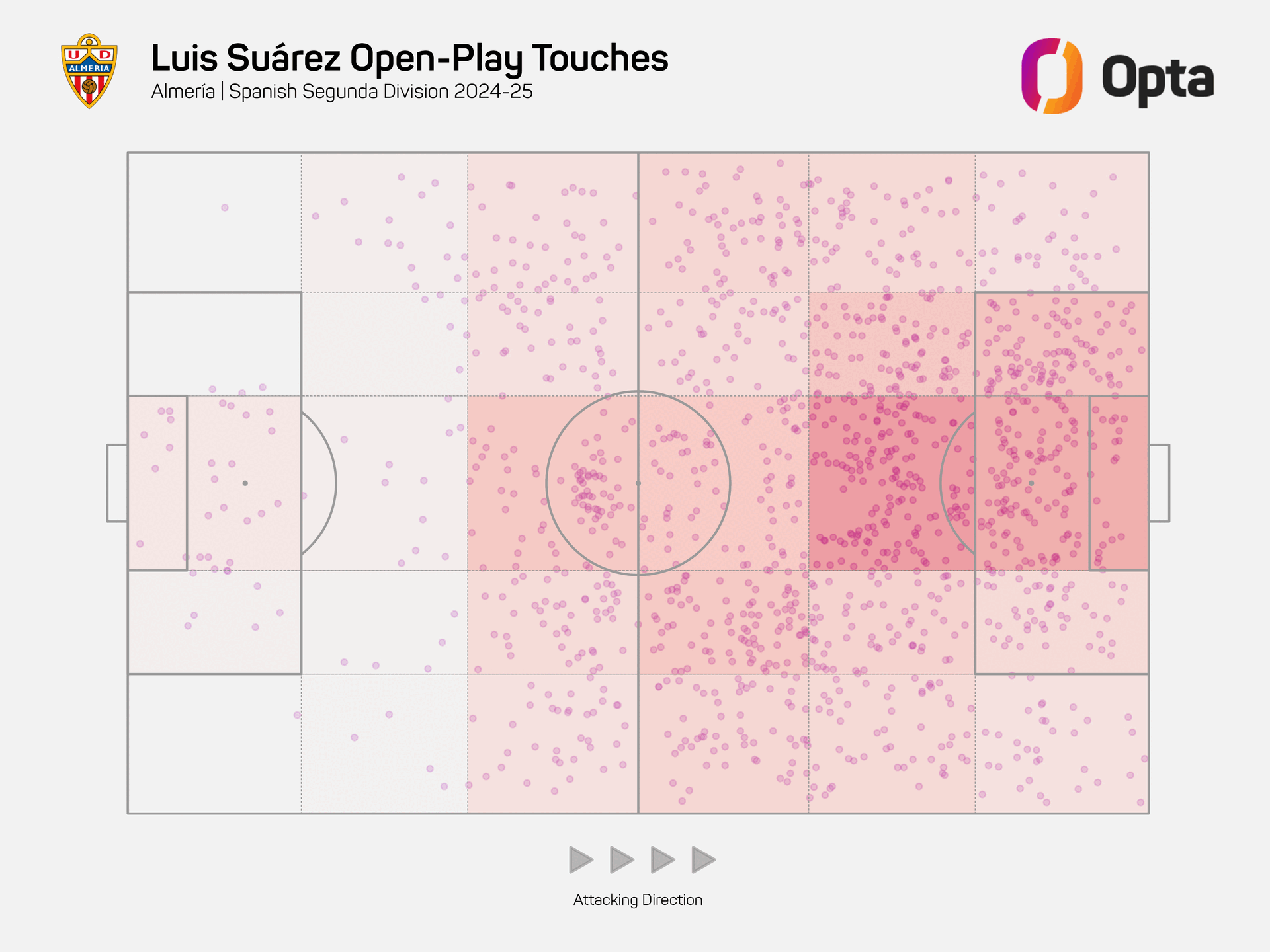
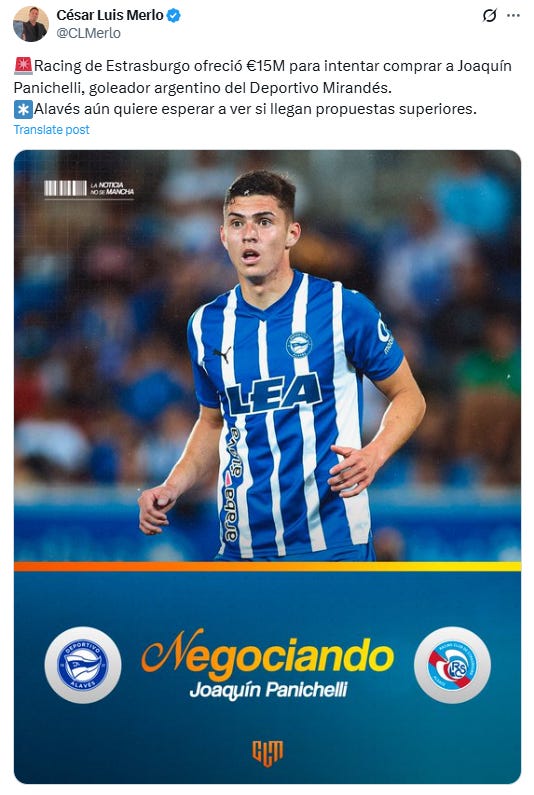

Enjoyed reading this.
Great job on this piece